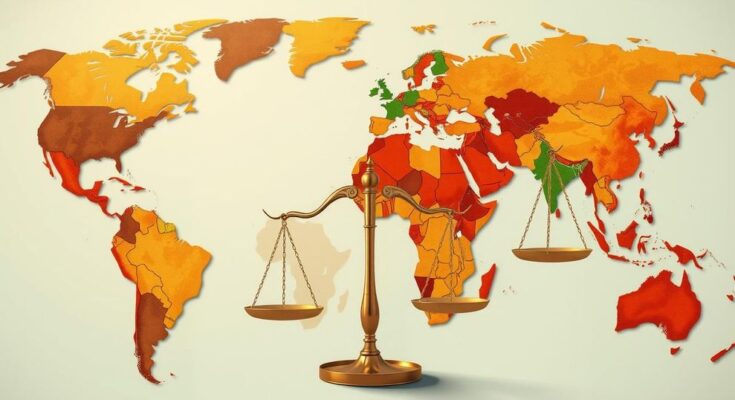Sudan has filed a case against the UAE at the ICJ, accusing it of complicity in genocide due to its support for the RSF, responsible for severe atrocities against the Masalit people. The evidence against the UAE involves military support and documented human rights violations. This case represents a critical moment for Global South solidarity, challenging inequities in international law and seeking accountability for state actions in conflict.
The recent case initiated by Sudan against the United Arab Emirates (UAE) at the International Court of Justice (ICJ) alleges the UAE’s complicity in genocide. The accusations center on the UAE’s support for the Rapid Support Forces (RSF), a paramilitary group engaged in a deadly power struggle with the Sudanese Armed Forces (SAF) since April 2023, which Sudan claims constitutes war crimes. Sudan’s complaint references atrocities the RSF committed against the Masalit people, where atrocities resulted in the death of up to 15,000 civilians and the displacement of over 500,000 individuals into Chad, mirroring previous conflicts of the early 2000s.
The charges against the UAE highlight its purported violations of the Genocide Convention, given its backing of the RSF’s genocidal actions. Numerous reports, including those from the Raoul Wallenberg Centre for Human Rights, document systematic killings and other forms of violence committed by the RSF. Forensic evidence, mass grave discoveries by the United Nations, and testimony from survivors indicate a targeted campaign against the Masalit, demonstrating clear intent to commit genocide. The U.S. State Department has classified the RSF’s acts as genocide, aligning with these documented findings although the designation came later than desired under the current U.S. administration.
The UAE’s involvement is supported by evidence from the U.N. Security Council and various investigative analyses, indicating its provision of arms to the RSF. Information from flight tracking data suggests that the UAE conducted at least 86 flights to the RSF’s base in Chad since the onset of conflict, raising significant concerns about its role in exacerbating violence. Furthermore, a secret drone base attributed to the UAE near the Sudanese border operated under the guise of humanitarian efforts, showcasing advanced military equipment that contributed to higher civilian casualties during conflicts.
The international landscape complicates Sudan’s pursuit of justice due to the substantial political and economic clout of the UAE. With a GDP of $569 billion, the UAE wields significant influence compared to Sudan’s economy of just $30 billion. Furthermore, the Emirati government’s connections with Western nations add layers of complexity to Sudan’s legal challenge. Lawmakers in the U.S. have voiced concerns regarding the UAE’s continued backing of the RSF, a betrayal of previous commitments to reduce military support, which has had catastrophic implications for civilians in Sudan.
The imbalances seen within international law raise pressing questions regarding justice and accountability, particularly highlighted by recent support for South Africa’s genocide claims against Israel. Nations from the Global South have rallied behind South Africa’s initiatives, demonstrating potential solidarity that Sudan seeks in its own legal battle. While Sudan’s situation does not evoke a robust legacy of anti-colonialism, it exposes similar struggles faced by contemporary post-colonial states. The current humanitarian crisis in Sudan reveals acute infant suffering amidst neglect and external exploitation, positioning Sudan’s challenges as a reflection of broader international failures.
For the Global South to remain credible in its support for justice, solidarity with Sudan is essential. Not supporting Sudan’s ICJ case risks reinforcing the inequities evident in the enforcement of international law, potentially undermining the justice system by allowing significant nations to act with impunity. It is critical to differentiate support for Sudan’s legal case from endorsement of its government, as recognition of the UAE’s alleged violations extends beyond local power struggles and relates to its broader geopolitical manipulation across several conflict-affected regions.
The forthcoming ICJ proceedings against the UAE underscore critical issues of international accountability and the urgent need for solidarity within the Global South. The success of Sudan’s case could reinforce the integrity of global justice mechanisms. Conversely, a lack of support for Sudan risks normalizing the impunity of powerful states like the UAE, thus undermining the fundamental principles of equality and justice in the international sphere. It is imperative that the Global South advocates for Sudan’s position, emphasizing a unified stance against violations of human rights, irrespective of the political complexities or challenges at play.
Original Source: foreignpolicy.com




